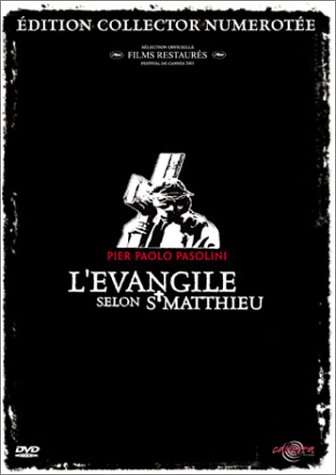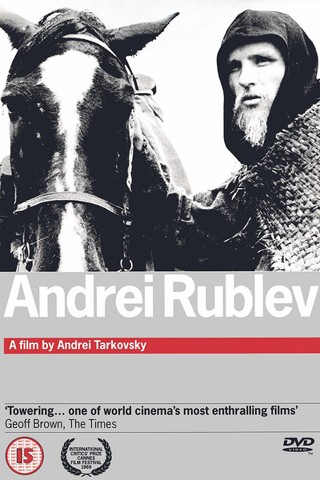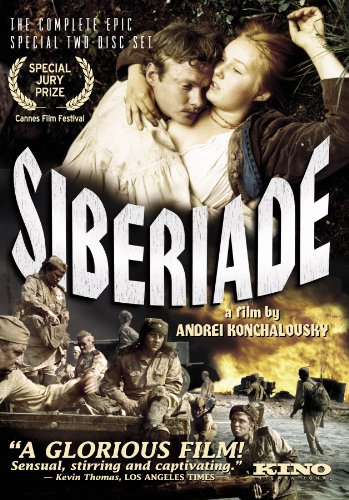Synopsis:
Set in 221 BC, The Emperor and the Assassin tells of Ying Zheng (Li Xuejian) and his obsession to unite seven Chinese kingdoms and become the first Emperor of China. The film mixes spectacular battle scenes with court intrigue, counterpointed by the King’s complex relationship with the only woman he has truly loved, the Lady Zhao (Gong Li). From protocol-ridden palaces to wide open grasslands, this is a visually striking film, both beautiful and at the same time burdened with the horrors of the period.Read More »
Epic
-
Kaige Chen – Jing Ke ci Qin Wang AKA The Emperor and the Assassin [+extra] (1998)
1991-2000ChinaDramaEpicFifth Generation Chinese CinemaKaige Chen -
Jerzy Kawalerowicz – Faraon (1966)
1961-1970ArthouseEpicJerzy KawalerowiczPolandQuote:
The Walter Reade Theatre at Lincoln Center in New York City’s retrospective – History Lessons: The Films of Jerzy Kawalerowicz, 30 January to 12 February 2004, screened the major work of this Polish director whose career spanned 50+ years. The programme offered, amidst the veteran’s varied output, a very special, culture vulture/archaeologist’s dream: Pharaoh (aka: Faraon), co-scripted by Kawalerowicz with Tadeusz Konwicki, and based on a novel by Boleslaw Prus. The best cinematic recreation of circa 1100 BC Late New Kingdom Dynastic Egypt ever, photographed on location at authentic sites and environs, the production design, costumes and props were all meticulously researched.Read More » -
Abel Gance – Bonaparte et la révolution (1972)
1971-1980Abel GanceDramaEpicFranceThe last film made by legendary French director Abel Gance, Bonaparte et la révolution (1971) was also his final attempt to release the Napoleonic biopic he had begun in the 1920s. Napoléon, vu par Abel Gance (1927) was over nine hours long, but represented only the first of a planned six-film series. Having failed to get funding for the remaining episodes, Gance revamped his silent film as Napoléon Bonaparte (1935) – adding newly-shot scenes and dubbing his decade-old footage. After other abortive attempts to resurrect part or all of his biopic in the 1950s, Gance gained funding from Claude Lelouch to release Bonaparte et la revolution in 1971. This last version recycles footage from the films of 1927 and 1935, as well as material from his television work of the 1960s. The result is a bizarre mishmash of old and new images, performances, and voices – less a coherent film than a document embodying the whole of Gance’s 45-year involvement with his eternally incomplete project. Read More »
-
Rob Epstein & Jeffrey Friedman – And the Oscar Goes To… (2014)
2011-2020DocumentaryEpicRob Epstein and Jeffrey FriedmanUSAOn the opening night of its annual 31 Days of Oscar festival, TCM presents the world premiere of “And the Oscar Goes To…”, a documentary tracing the history of the Academy Awards. The documentary is one of a series of programming events leading up to the TCM 20th anniversary in April 2014. In telling the story of the gold-plated statuette that became the film industry’s most coveted prize, And the Oscar Goes To… traces the history of the Academy itself, which began in 1927 when Louis B. Mayer, then head of MGM, led other prominent members of the industry in forming this professional honorary organization. Two years later the Academy began bestowing awards, which were nicknamed “Oscar” and quickly came to represent the pinnacle of cinematic achievement.Read More »
-
Theodoros Angelopoulos – O thiasos aka The Traveling Players (1975)
1971-1980DramaEpicGreeceTheodoros AngelopoulosHere is an excellent overview of the film that provides a ton of background information that greatly helps in understanding this outstanding film.
from Jump Cut, no. 10-11, 1976, pp. 5-6
copyright Jump Cut: A Review of Contemporary Media, 1976, 2004“In THIASSOS even though we refer to the past, we are talking about the present. The approach is not mythical but dialectical. This comes through in the structure of the film where often two historical times are dialectically juxtaposed in the same shot creating associations leading directly to historical conclusions… Those links do not level the events but bypass the notions of past/present and instead provide a linear developmental interpretation which exists only in the present.”
— Theodoros AngelopoulosRead More » -
Aleksandr Dovzhenko – Zemlya AKA Earth (1930)
1921-1930Aleksandr DovzhenkoAmos Vogel: Film as a Subversive ArtEpicSilentUSSRQuote:
Dovzhenko was commissioned to make what was intended to be a minor propaganda film to encourage the establishment of farming collectives. Under Dovzhenko’s lyrical montage and photography what emerged far exceeded propaganda; Earth has repeatedly made every international top ten film list.Read More » -
Pier Paolo Pasolini – Il Vangelo secondo Matteo AKA The Gospel According to Matthew [+Extras] (1964)
Drama1961-1970EpicItalyPier Paolo Pasolinifrom imdb:
Along a rocky, barren coastline, Jesus begins teaching, primarily using parables. He attracts disciples; he’s stern, brusque, and demanding. He comes to bring a sword, not peace, he says. He’s in a hurry, moving from place to place near the Sea of Galilee, sometimes attracting a multitude, sometimes being driven away. His parables often take on the powers that be, so he and his teachings come to the attention of the Pharisees, the chief priests, and elders. They conspire to have him arrested, beaten, tried, and crucified, just as he prophesied to his followers. After he dies, he appears to his disciples and gives them final instructions.Read More » -
Andrei Tarkovsky – Andrey Rublyov (1966)
1961-1970Amos Vogel: Film as a Subversive ArtAndrei TarkovskyArthouseEpicUSSRQuote:
Widely recognized as a masterpiece, Andrei Tarkovsky’s 205-minute medieval epic, based on the life of the Russian monk and icon painter, was not seen as the director intended it until its re-release over twenty years after its completion. The film was not screened publicly in its own country (and then only in an abridged form) until 1972, three years after winning the International Critics Prize at the Cannes Film Festival. Calling the film frightening, obscure, and unhistorical, Soviet authorities edited the picture on several occasions, removing as much as an entire hour from the original.Presented as a tableaux of seven sections in black and white, with a final montage of Rublev’s painted icons in color, the film takes an unflinching gaze at medieval Russia during the first quarter of the 15th century, a period of Mongol-Tartar invasion and growing Christian influence. Commissioned to paint the interior of the Vladimir cathedral, Andrei Rublev (Anatoli Solonitsyn) leaves the Andronnikov monastery with an entourage of monks and assistants, witnessing in his travels the degradations befalling his fellow Russians, including pillage, oppression from tyrants and Mongols, torture, rape, and plague. Faced with the brutalities of the world outside the religious enclave, Rublev’s faith is shaken, prompting him to question the uses or even possibility of art in a degraded world. After Mongols sack the city of Vladimir, burning the very cathedral that he has been commissioned to paint, Rublev takes a vow of silence and withdraws completely, removing himself to the hermetic confines of the monastery.
Read More » -
Andrei Konchalovsky – Sibiriada aka Siberiade (1979)
1971-1980Andrei KonchalovskyDramaEpicUSSRAmazon.com—
This ambitious 1979 Russian film attempts no less a feat than the encapsulation of the tumultuous history of Russia in the 20th century. Written and directed by Andrei Konchalovsky (Runaway Train, Tango and Cash), the film weaves an engrossing tale of three generations of two Russian families in the remote region of Siberia, each trying in their own way to find fulfillment in their lives as they seek to reconcile themselves with the ever-changing landscape of their homeland. Sandwiched between the chaotic events of the First and Second World Wars, as well as the Russian Revolution of 1917, the people of the small village find themselves at the cusp of great changes, from communications to the expanding infrastructure and the changes that brings, to the discovery of oil and the riches and perils that come with it. Konchalovsky juxtaposes archival footage with stunning cinematography and contrasts the assaultive changes of the modern world with the timeless impulses of family and the enduring need to adapt and survive. Reminiscent of such great films as Giant and 1900, Siberiade is a visually adept and stunningly effective epic about the price of a country’s history on its people. —Robert Lane
Read More »








